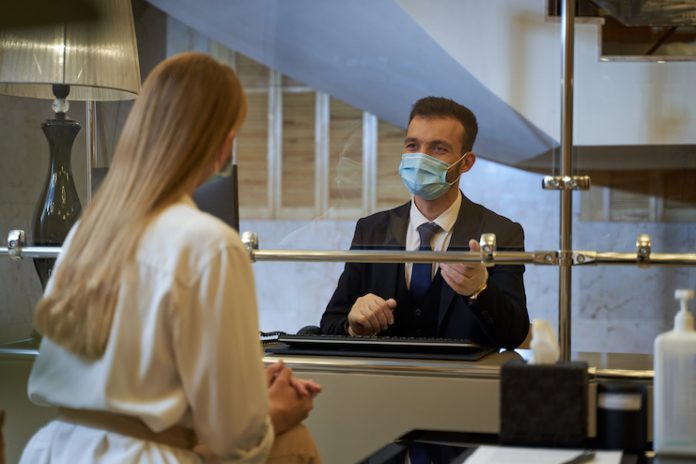On August 19, 2021, PwC had a conference meeting to discuss the findings from its Next in Work Pulse Survey. An overview of the survey discusses insights on vaccine rollouts, lessons learned from the pandemic, and what employees want from their place of work.
Weighing Vaccines
The survey found that both two-thirds of executives and two-thirds of employees are in favor of a vaccine mandate as a condition of returning in person to the office, and one-third of each group opposed. PwC is split about mandating vaccines and whether employers should take a leadership role on this point. Additionally, 44 percent of executives say they will take a leadership role in encouraging employees to get vaccinated over the next 12 months.
Employees Seeking New Job Opportunities
Sixty-five percent of employees are looking for a new job, up from 36 percent in May. Among executives, 88 percent say they are seeing higher turnover than normal. The top reason employees state they are looking for a new job is a better salary, followed by benefits. When asking executives, only 23 percent believed benefits were a reason employees were leaving. For the employees seeking new opportunities, flexibility, expanded benefits, and compensation were top incentives. Many are also seeing job changes as an opportunity to close pay gaps with 46 percent of women seeking higher salaries compared to 34 percent of men, and more Hispanic (82 percent) and Black (67 percent) employees, compared to white/non-Hispanic (57 percent) employees.
Remote Work
Almost one-fifth (19 percent) of all employees would like to be fully remote today even if COVID-19 were no longer a concern. The majority prefer a hybrid model with a variation of in-office and remote days. Even as executives finalize and work through their hybrid work plans, they cite corporate culture as their biggest challenge. Employees, however, are willing to seek new job opportunities for the right flexibility. And, among employees seeking new jobs, almost one in 10 say it is because they moved away from the office while working remotely and don’t want to go back to on-site work.
Other concerns executives have expressed are loss of mentoring (30 percent), loss of innovation opportunities (26 percent), and potential equity issues between on-site and fully remote workers (25 percent). As hybrid work models evolve, companies should mitigate any potential risks of remote work inequity and help ensure they are creating a culture of inclusion and belonging for everyone.
Recognizing Inclusivity Efforts
Initiatives around culture, value, and purpose will be just as important for shaping the future of work, with almost half of executives saying culture, value, and purpose differentiate them in the competitive talent market. Also, aided by stakeholder capitalism, over half (57 percent) of companies are advancing diversity and inclusivity initiatives internally and 42 percent plan to improve ESG reporting.
Diversity and inclusion are important for investors and board members, and now over a third (35 percent) of employees say there is a high level of trust between them and employers. Although inclusive leadership may not be a priority for employees looking for reasons to stay at their job or leave, it can be enough to sway decisions and external perceptions.
The Role of CHROs
CHROs say retaining employees is their number-one priority in the next three to six months. CHROs see inclusion and inclusive leadership as a key to addressing challenges, including creating a work environment where people feel valued and can be themselves, with leaders who are empathetic and provide equal opportunities and resources to everyone. More than a third of CHROs (36 percent) identified building inclusive leadership in a hybrid workplace as one of their top three priorities for the next three months.
Focusing on the employee experience is key to both retention and to navigating hybrid work. Strong leadership skills are critical to retaining and engaging talent; leaders shape the vision for their team, coach employees, influence well-being, and support the redesign of work, all of which contribute to overall employee experience. The survey recommends using employee listening tools, preference analytics, and sentiment surveys to better understand employees’ needs and identify flight risks early on, and wherever possible, take a personalized approach to designing the right compensation and benefits to motivate them to stay, as well as considering offering development opportunities that help employees grow and working to strengthen and reinforce the employee value proposition as a way to attract and retain talent.
CHROs are also zeroed in on getting employees vaccinated. Nearly a third (29 percent) of HR leaders identified encouraging employees to get vaccinated against the virus as a top priority for the next three to six months. While a growing number of large businesses are mandating vaccines, others are hoping they’ll be able to stop short of a mandate if they can entice their workforce to get the vaccine by choice such as incentives like paid time off or spot bonuses. Regardless of whether companies mandate vaccinations or opt for encouragement, CHROs should be prepared with policies and responses related to vaccine status.
Lessons From the Pandemic
The past 18 months have been a learning experience and an experiment in how people work. As a result, more than a quarter (28 percent) of employees and executives strongly agree they are making permanent changes to how and where work gets done based on lessons learned from the pandemic. Companies are going to have to continue to change the way they work to retain talent.
But with continued turbulence likely in the business landscape, robust scenario planning will be critical to redesigning work for the future as well as making sure business can be agile and move forward during periods of uncertainty. People scouting for new opportunities have their sights on more tangible rewards. Flexibility, benefits, and compensation are the top incentives for employees.











